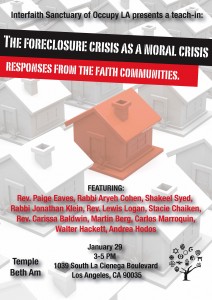 Yesterday, Sunday, I was privileged to organize and participate in a teach in sponsored by the Interfaith Sanctuary of Occupy LA at Temple Beth Am in the Pico-Robertson neighborhood. (This was the second teach-in of this kind that we put on. The first was on New Years Day at All Saints Church in Pasadena as part of Occupy the Rose Parade.)
Yesterday, Sunday, I was privileged to organize and participate in a teach in sponsored by the Interfaith Sanctuary of Occupy LA at Temple Beth Am in the Pico-Robertson neighborhood. (This was the second teach-in of this kind that we put on. The first was on New Years Day at All Saints Church in Pasadena as part of Occupy the Rose Parade.)
The first panel was comprised of Martin Berg, longtime journalist and the editor of Where’sOurMoney.org, Carlos Marroquin, a foreclosure activist with Occupy LA, and Peter Kuhns, an organizer with ACCE, the Alliance of Californians for Community Empowerment. The panel addressed the questions that many people ask about the foreclosure crisis: Isn’t it the fault of people who just bought too much house and couldn’t pay for it? Why should we pick up the tab for people who couldn’t pay the debts that they had accumulated. In answering this question the panelists talked about the seeds of the foreclosure crisis in the predatory lending practices of the previous decades which overwhelmingly targeted communities of color and low income people. They also discussed the barriers that the banks were putting up so that people who qualified to modify their loans were not getting the loan modifications they should be getting. Finally they talked about the human stories, people who worked hard all their lives, who were caught up in a trap laid for them by banks who were out to make even more money, who were evicted from their homes. But they also talked about some stories of hope, in which the bankers, when forced into the light of day, agreed to modify loans and let people remain in their houses.
The video of this first panel, thanks to the Livestreaming skills of Califather, is here:
The second panel was comprised of faith leaders who addressed the question of the response of the faith communities. The panel was moderated by United Methodist Pastor Paige Eaves of Crescenta Valley United Methodist Church, and included Shakeel Syed, the Executive Director of the Islamic Shura Council of Southern California, Rabbi Jonathan Klein, the Executive Director of Clergy and Laity United for Economic Justice—Los Angeles (CLUE-LA), Rev. Peter Laarman, Executive Director of Progressive Christians Uniting, and your humble servant. We discussed the religious issues that were raised by the foreclosure crisis, the issue of shame around foreclosures and ways to engage it both pastorally and politically, and issues of the market and materialism.
The video of the second panel, is here.
The teach was brought to a close by Andrea Hodos with a group movement performance that brought a lot of the themes of the day together.
The video of Andrea’s piece is here.
 Both Thanksgiving and Hanukkah are holidays that celebrate a mythic narrative. In both cases the myth replaced a much more gruesome reality. Thanksgiving celebrates the Pilgrims surviving the first winter in the New World with the help of the Native Peoples. In celebration people come together to give thanks for the good things in their own lives–family, friendship, plenty. These are good things to celebrate. However, the myth of the Native Americans welcoming the Europeans to this part of the world erases the story of genocide, atrocity, and displacement which was the actual fate of most of the Native Americans. As Malcolm X said in a different context, the Native Peoples did not land on Plymouth Rock, it landed on them. So, while gratitude is an important practice, so is truth and the admission of culpability. Continue reading
Both Thanksgiving and Hanukkah are holidays that celebrate a mythic narrative. In both cases the myth replaced a much more gruesome reality. Thanksgiving celebrates the Pilgrims surviving the first winter in the New World with the help of the Native Peoples. In celebration people come together to give thanks for the good things in their own lives–family, friendship, plenty. These are good things to celebrate. However, the myth of the Native Americans welcoming the Europeans to this part of the world erases the story of genocide, atrocity, and displacement which was the actual fate of most of the Native Americans. As Malcolm X said in a different context, the Native Peoples did not land on Plymouth Rock, it landed on them. So, while gratitude is an important practice, so is truth and the admission of culpability. Continue reading 

 A few weeks ago, I was in a meeting discussing an upcoming ballot initiative which would eliminate the death penalty in favor of life imprisonment without the possibility of parole. Everybody in the room was opposed to the death penalty. The discussion was about the strategy that should be employed to convince voters to make the proposition law. The campaign’s tactic was to argue that the death penalty was more expensive than life imprisonment without the possibility of parole (LWOP). This is, of course, true. As the
A few weeks ago, I was in a meeting discussing an upcoming ballot initiative which would eliminate the death penalty in favor of life imprisonment without the possibility of parole. Everybody in the room was opposed to the death penalty. The discussion was about the strategy that should be employed to convince voters to make the proposition law. The campaign’s tactic was to argue that the death penalty was more expensive than life imprisonment without the possibility of parole (LWOP). This is, of course, true. As the